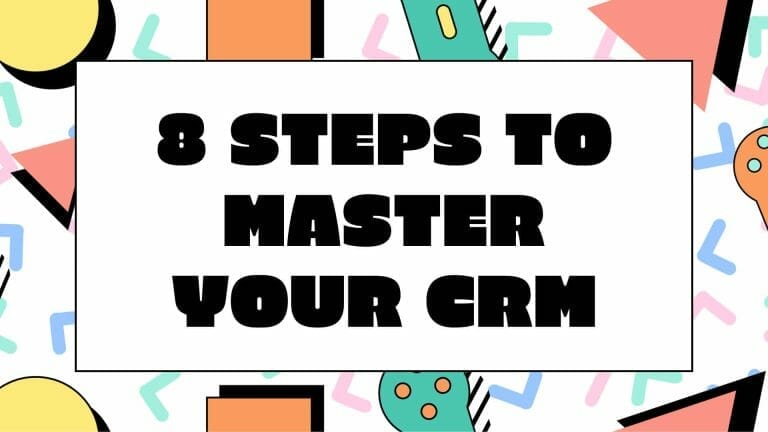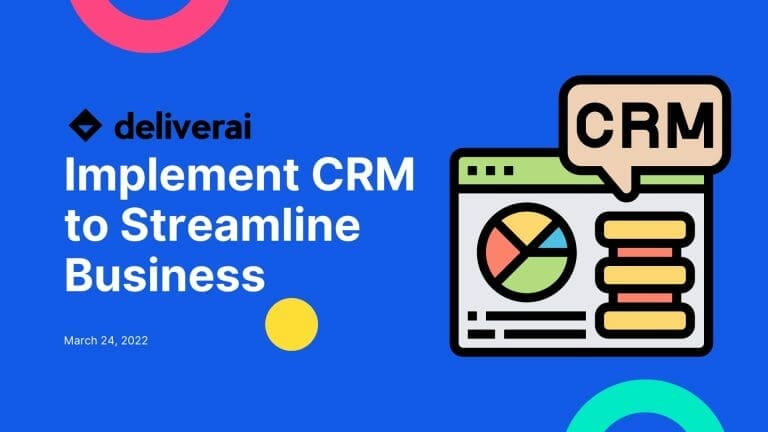Enter the world of CRM, aka Customer Relationship Management. If businesses were superheroes, then CRM would be their trusty sidekick. But before we get lost in the Marvel-ous (pun intended) world of analogies, let’s break it down.
CRM is not just another tech jargon. It’s an advanced system designed to simplify, streamline, and amplify customer interactions for businesses. When you think of CRM, imagine a massive digital Rolodex (old school, I know) that doesn’t just store contact numbers. It also reminds you of when you last spoke to a client, what you discussed, and even when they might be due for a follow-up call.
But why is this so revolutionary? Well, consider this. You run a small bakery, and Mrs. Patterson comes in every Saturday to buy blueberry muffins. One day, using the insights from your CRM system, you send her a discount code for her favorite muffins on her birthday. She’s thrilled! This simple gesture, empowered by the benefits of CRM for small business, turns Mrs. Patterson from a regular customer to a loyal advocate for your brand.
And that’s the power of CRM. It’s not about data; it’s about relationships. It’s about understanding your customers, meeting their needs, and even anticipating them. The benefits of CRM for small businesses are countless, and we’re just scratching the surface. Dive deeper, and you’ll find a tool that can transform customer relationships into partnerships, making sure your business thrives in this competitive landscape.
Small Business CRM benefits Categorized
Diving into the world of small businesses, it’s often the personal touch and intimate relationships that set them apart. However, as businesses grow, maintaining that closeness with every customer can be a tad challenging. Enter CRM. The benefits of CRM for small businesses lie in its ability to seamlessly merge technology with this personal touch.
CRM acts as an extension of a small business’s ethos. It’s like having a digital assistant that remembers everything – from Mr. Thompson’s preference for gluten-free cookies to the fact that Ms. Reyes always orders extra toppings on her pizza on Fridays. But beyond these personal notes, CRM’s real power emerges in its capacity to streamline operations. By automating tasks and providing actionable insights from data, CRM allows businesses to be more efficient, targeted, and effective in their outreach.
For the sake of this article, we will divide the benefits of CRM for small businesses into three different categories:
- Managing Customer Relationships
- Streamlining Business Process
- Enhancing Sales Performance
In a nutshell, while CRM offers a technological solution, its core advantage is in enhancing the human element of business – building and maintaining relationships. As we delve deeper, you’ll discover that the benefits of CRM for small businesses are vast, transforming them from local favorites to formidable market competitors.
Managing Customer Relationships
For small businesses, customers are not just numbers on a sales report; they’re the heart and soul of the business. Building and managing these relationships is crucial, and the good news is, CRM tools make this a breeze. One of the primary benefits of CRM for small business is how it supercharges their customer relationship management. No longer do businesses need to rely on memory or scattered notes. Everything is in one place, ensuring consistency, accuracy, and depth in interactions.
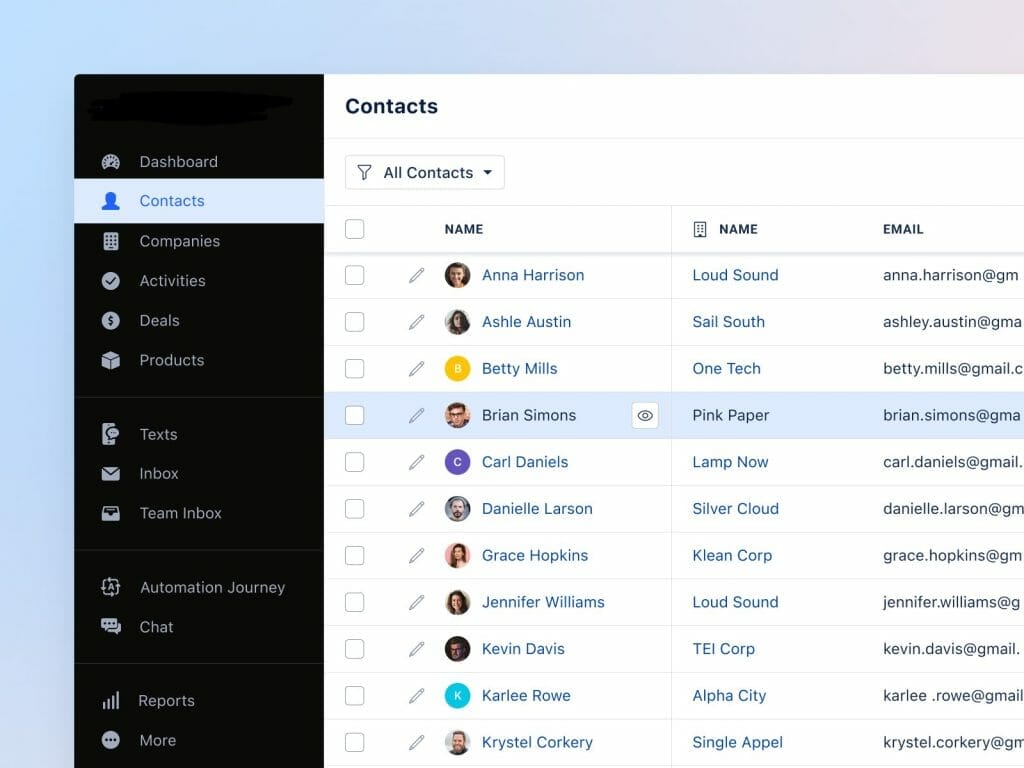
Improving Customer Satisfaction
A satisfied customer is worth their weight in gold. CRMs allow businesses to cater to individual customer needs, preferences, and histories. Picture this: Sarah, a loyal customer, contacts your support team. With CRM, the team instantly knows her purchase history, past concerns, and even her preferences. They can swiftly address her query, making her feel valued and understood. This personalized approach, facilitated by CRM, ensures that customers always leave with a smile.
Enhancing Customer Retention
In the competitive market, retaining customers is as vital as acquiring new ones. One of the standout benefits of CRM for small business is its role in customer retention. With features like automated follow-ups, personalized offers, and feedback mechanisms, CRM tools ensure that customers stay engaged, loyal, and most importantly, happy.
Strengthening Customer Relationships
Deepening ties with existing customers is an art, and CRM is the brush. By providing insights into customer behavior, purchase patterns, and feedback, CRM helps businesses tailor their offerings and interactions. This means every communication feels personal and relevant, further cementing the bond with the customer.
Increasing Customer Base and Loyalty
Word-of-mouth is powerful, especially for small businesses. Happy customers lead to referrals. With CRM’s ability to track referrals, manage loyalty programs, and roll out referral bonuses, businesses can exponentially grow their customer base. It’s like planting a tree, nurturing it, and then watching it bear fruits that lead to even more trees.
Streamlining Business Processes with CRM
In the bustling life of a small business owner, efficiency is the name of the game. Each minute is precious, and anything that saves time without compromising on quality is worth its weight in gold. Herein lies one of the prime benefits of CRM for small businesses: it’s a master tool for streamlining myriad business processes. CRM isn’t just about customers; it’s also about making the business’s internal operations smoother and more efficient.
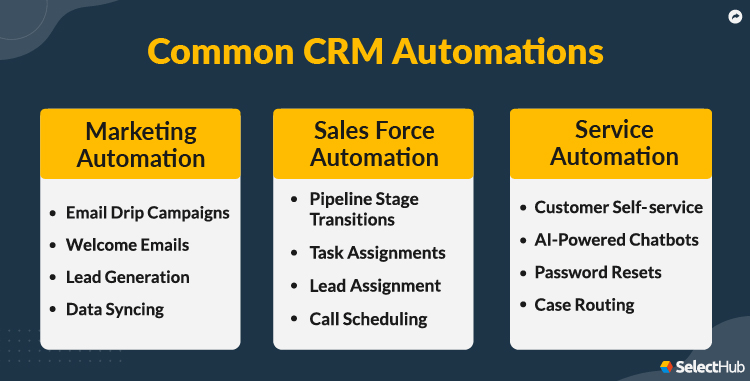
Automating Repetitive Tasks
Think of the countless hours spent on mundane tasks like sending follow-up emails, scheduling appointments, or inputting data. Now, imagine a world where these tasks magically take care of themselves. That’s the world CRM offers. Automating these repetitive tasks is one of the transformative benefits of CRM for small business. It allows teams to focus on what truly matters: building relationships and driving growth.
Optimizing Sales Processes & Cycles
Every business dreams of a world where sales cycles are short and sweet. CRM is the ticket to this dreamland. By analyzing sales data, CRM helps identify bottlenecks and inefficiencies in the sales process. Maybe it’s that one step in the sales funnel where most prospects drop off, or perhaps it’s a product feature that’s not resonating. With these insights, businesses can refine their approach, ensuring a quicker and more efficient path from lead to customer.
Tracking & Analyzing Sales Funnel & Pipeline
Visualizing the sales funnel is essential for any business. With CRM, this visualization comes to life. Businesses can track where each potential customer is in the buying journey. This not only allows for timely interventions but also provides a clear picture of potential revenues and areas of focus. It’s like having a crystal ball that shows you the future of your sales!
Improving Accuracy of Customer Records
A misplaced decimal or an incorrect email can lead to missed opportunities or even disgruntled customers. Accuracy is paramount. CRM tools ensure that customer data is accurate, up-to-date, and easily accessible. Say goodbye to digging through piles of paperwork or corrupted Excel sheets. CRM ensures that the information you need is just a click away.
As we can see, the benefits of CRM for small business are not limited to just managing customers. It’s a holistic tool that touches every aspect of a business, turning chaos into streamlined processes.
Enhancing Sales Teams Performance
Sales teams are the engine room of a small business, driving growth and fostering customer relationships. Now, imagine supercharging this engine. That’s precisely the impact of CRM. One of the remarkable benefits of CRM for small business lies in its ability to propel sales teams to new performance heights. From collaboration to productivity, CRM ensures that every cog in the sales machinery works seamlessly and efficiently.
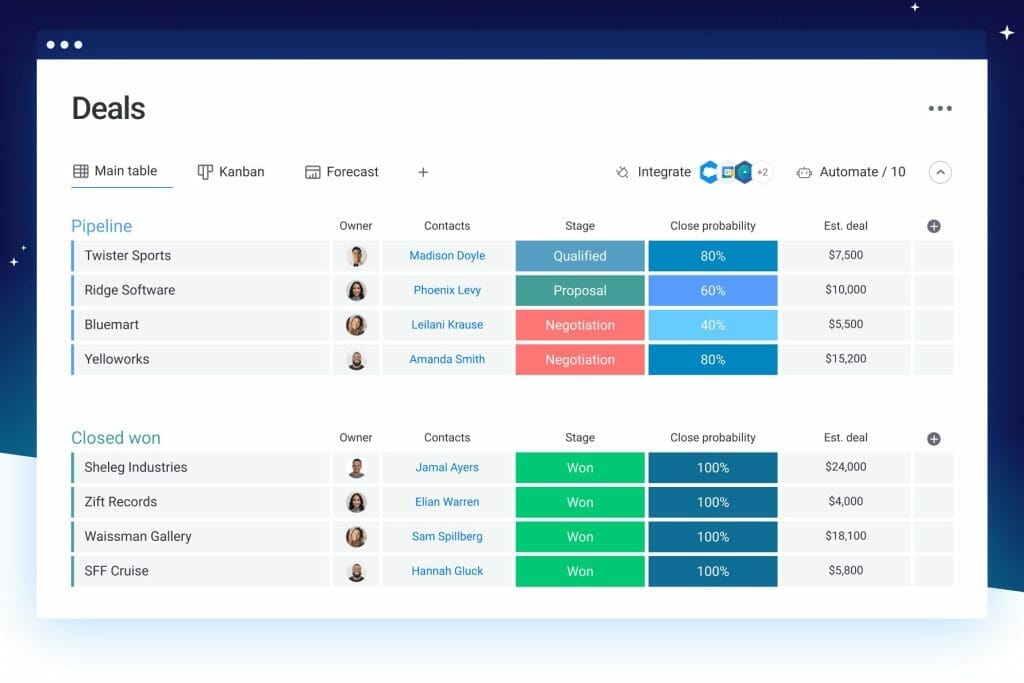
Optimizing Team Collaboration & Interactions
Collaboration is the secret sauce of successful sales teams. With CRM, this collaboration gets a major boost. Think of a scenario where a sales rep is out meeting a potential client. With real-time data access, they can pull up the client’s entire history, recent interactions, preferences, and more. Furthermore, if another team member had a previous interaction, notes can be easily accessed, ensuring a consistent and informed approach. This real-time information sharing ensures that the entire team is singing from the same hymn sheet, leading to cohesive and informed interactions.
Increasing Productivity and Efficiency of Sales Reps
A sales rep’s time is invaluable. Every minute spent on manual data entry or searching for client information is a minute lost from potential sales. CRM systems are the magic wand that brings efficiency into the mix. Automated data entry, appointment scheduling, and follow-up reminders are just some of the features that free up sales reps’ time. The benefits of CRM for small businesses shine particularly bright here: By minimizing these administrative tasks, sales reps can focus on what they do best – selling and nurturing customer relationships.
To encapsulate, the world of sales is a dynamic and challenging landscape. The benefits of CRM for small businesses in this realm are manifold, from ensuring teams work in harmony to maximizing the productivity of each sales rep. The end result? A sales team that’s not just efficient, but also empowered, informed, and ready to conquer the market.
Frequently Asked Questions
Diving deep into the realm of CRM, it’s natural for curiosities and queries to bubble up, especially when you consider the transformative benefits of CRM for small business. In our journey thus far, we’ve illuminated many facets of CRM, but let’s now address some of the burning questions that businesses often grapple with.
What Features Do You Need in a CRM?
While the specific needs may vary from one business to another, some features are universally beneficial. These include contact management, sales tracking, email integration, and reporting capabilities. Additionally, for the tech-savvy era we live in, mobile access is becoming increasingly important. So, whether you’re tracking a lead or checking sales data on the go, your CRM should be accessible with just a tap on your mobile device.
Which Business Teams Need CRM?
Traditionally, one might think only the sales team requires CRM. However, in reality, its benefits permeate various departments. Marketing teams use it to track campaign performance, customer service to log queries and solutions, and even HR teams to manage internal communications and processes. Essentially, any team that interacts with people – be it customers, clients, or employees – can leverage the benefits of CRM for small business.
What is an open-source CRM?
Open-source CRM systems are like DIY kits for businesses. They offer the basic framework, and businesses can customize them based on their specific needs. The major advantage? Flexibility. Since the source code is openly available, businesses can modify it to their heart’s content. Plus, they’re often more budget-friendly. The trade-off, however, is that you might need a bit more tech expertise to set up and manage.
Who uses CRM?
From local bakeries that want to remember every customer’s favorite pastry to multinational corporations managing complex sales pipelines, businesses of all sizes and from all sectors use CRM. The beauty and benefits of CRM for small business lie in its scalability and adaptability.
What are the different types of CRM?
There are three primary types: Operational (focused on sales, marketing, and service automation), Analytical (centered on data analysis and customer insights), and Collaborative (emphasizing communication between teams and customers). Depending on a business’s needs, they might opt for one type or a combination.
My business is very small. Do I need a CRM Solution?
The answer is a resounding yes! Size doesn’t diminish the importance of organized customer data and streamlined processes. If anything, small businesses stand to gain immensely as they can nurture deeper, more personal relationships with their customers, powered by CRM insights.
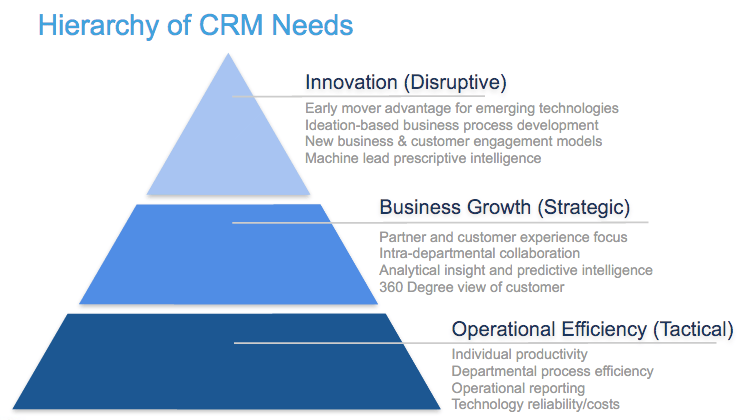
There you have it, a snapshot of the most pressing questions around CRM. And remember, the benefits of CRM for small business aren’t just in its features but in how it empowers businesses to understand, engage, and grow with their customers.
Conclusion
Navigating the maze of small business challenges is no small feat, pun intended. From managing customer relationships to optimizing internal processes, the journey can be filled with complexities. However, the benefits of CRM for small businesses serve as a trusty compass, guiding businesses through the labyrinth with efficiency, effectiveness, and ease.
Through our exploration, we’ve unearthed how CRM isn’t just a tool but a comprehensive solution that touches every facet of a small business. It elevates customer satisfaction by tailoring personalized experiences and acts as the glue that holds teams together, fostering collaboration and streamlining tasks. The benefits of CRM for small businesses stretch from the sales floor to the back office, shaping a cohesive, data-driven, and customer-centric approach.
As we’ve tackled some frequently asked questions, we hope any lingering curiosities you had have been addressed. If the question “Does my small business need CRM?” still lingers in your mind, the answer is a thunderous “Yes!” The time and effort saved, the insights gained, and the relationships built to provide an invaluable return on investment.
To put it simply, CRM does more than just manage customer relationships for small businesses; it transforms them into agile, data-driven, customer-focused organizations. So if you’re a small business looking to punch above your weight in a crowded market, adopting a CRM system could be your secret weapon. In leveraging these numerous benefits, you’re not just adopting software; you’re adopting a strategy for long-term success.
And there we have it, folks—a complete guide to understanding the multifaceted benefits of CRM for small businesses. May your CRM journey turn your small business into the next big thing!




